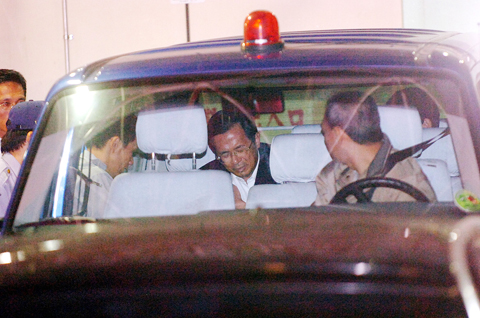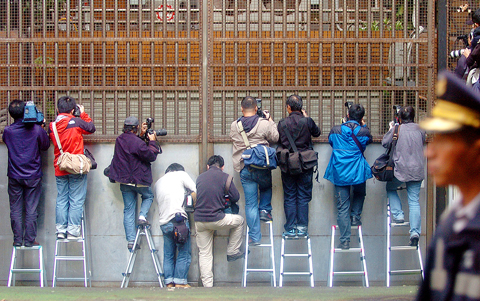The Taipei District Court early yesterday morning granted a request by prosecutors to detain former president Chen Shui-bian (陳水扁) in connection with corruption allegations, making him the first former president in the nation’s history to be arrested.
Chen is accused of embezzling about NT$15 million (US$450,000) while in office, money laundering, taking bribes and forgery.
The court decision capped 24 hours of high political drama, which saw a defiant Chen being led away in handcuffs, taken to hospital after claiming he had been assaulted by a bailiff and finally put behind bars.

PHOTO: GEORGE TSORNG, TAIPEI TIMES
Chen was escorted to court at about 4:30pm on Tuesday for a hearing on a request for his detention following seven hours of questioning by prosecutors from the Supreme Prosecutors’ Office’s Special Investigation Panel (SIP).
Taipei District Court spokesman Huang Chun-min (黃俊明) said judges Liu Huang-chi (劉煌基), Yeh Li-chi (葉力祺) and Liu Hsiu-chun (劉秀君) began the hearing to consider the detention request at about 8pm on Tuesday night. During the hearing, Chen complained he had been hit by one of the guards while leaving the prosecutors’ office.
At about 11pm, Liu interrupted the hearing and ordered that Chen be sent to the National Taiwan University Hospital for an examination.

PHOTO: CHANG CHIA-MING, TAIPEI TIMES
Prosecutors reviewed video footage to determine when Chen was allegedly hit, but SIP spokesman Chen Yun-nan (陳雲南) said later that no evidence was found to back the claim.
Although doctors confirmed that the former president had strained an arm muscle, there was no evidence to prove that the injury was the result of a blow.
Chen Shui-bian was then escorted back to the court and the hearing resumed at 1am. At 7:05am, the three judges reached a decision, granting the detention request.
Chen Shui-bian left the court at about 8am under the protection of National Security Bureau (NSB) special agents and police, arriving at the Taipei Detention Center in Tucheng (土城), Taipei County, at about 8:30am.
At about the same time, Ministry of Justice Deputy Minister Huang Shih-ming (黃世銘) told a press conference that although the former president had been detained, he would have certain privileges because he was innocent until proven guilty.
“He can choose whether he wants a single room,” Huang said. “One of the NSB agents responsible for his security will also be allowed to stay with him to act as a liaison officer.”
Huang said Chen Shui-bian’s security was now the responsibility of the detention center, although NSB agents would be called whenever he was summoned for hearings or questioning.
In a statement yesterday, Chen Shui-bian’s office said the former president would relinquish his right to appeal the detention ruling in protest at what he called “political persecution” and a “political vendetta” against him.
Chen Shui-bian’s lawyer, Cheng Wen-long (鄭文龍), said in a statement that it would be pointless for the former president to appeal because the SIP had already reached a verdict and “the script has already been written.”
“It is political persecution and a political vendetta,” Cheng said.
The statement said Chen Shui-bian had expected to be detained and that this was a sacrifice he would endure.
He was willing to bear the cross of persecution, but he would like to see all other Democratic Progressive Party (DPP) politicians — who he said were innocent — released, the statement said.
The office issued another statement denying that Chen Shui-bian had broken the law and criticizing the SIP for ignoring a Supreme Court ruling, which acquitted President Ma Ying-jeou (馬英九) of corruption charges on the grounds that Ma’s use of “special allowance funds” during his tenure as Taipei mayor exceeded the amount he received.
Chen Shui-bian’s office accused the SIP of being influenced by politics and bowing to the media, which it said is under the control of the Ma administration. The office also accused the SIP of violating Chen Shui-bian’s rights.
Saying the SIP had not obtained enough evidence to detain the former president, the statement said prosecutors had used diplomatic missions for political infighting and disregarded Chen Shui-bian’s efforts and the contribution he made to national security and Taiwan’s international space.
“Prosecutors and investigators have reached a point that they are acting arbitrarily and the judiciary autocratically,” the statement said.
The statement also argued that Chen Shui-bian was innocent of all charges and should be acquitted.
On the alleged misuse of Chen’s “state affairs fund,” the statement said the court should refer to Ma’s not guilty verdict and clear the former president’s name.
The statement said Chen claimed more than NT$190 million in “state affairs funds” and spent about NT$203 million during his two terms in office. Chen did not embezzle the money, it said.
It was “ludicrous” for prosecutors to claim that Chen Shui-bian and former National Security Council secretary-general Chiou I-jen (邱義仁) had claimed the money from the Ministry of Foreign Affairs’ “secret funds,” the statement said, adding that Chen had never pocketed any of the money.
Regarding political donations, the statement said Chen had admitted he had falsely declared leftover campaign funds and that some of the money was wired overseas without his knowledge.
Prosecutors, however, could not use his confession as a political tool or assume that political donations were bribes, the statement said.
As all politicians have leftover campaign funds and political donations, the statement requested a complete investigation into all election finances of all politicians — especially presidential candidates — since 1996.
The statement also criticized the Chinese Nationalist Party (KMT) for casting doubt on the legitimacy of other parties’ assets, given its own substantial assets. At issue was not whether Chen Shui-bian would be convicted, the statement said, but rather the urgent and serious issue of election funds, political donations and stolen party assets.
ADDITIONAL REPORTING BY AFP

Taiwan yesterday denied Chinese allegations that its military was behind a cyberattack on a technology company in Guangzhou, after city authorities issued warrants for 20 suspects. The Guangzhou Municipal Public Security Bureau earlier yesterday issued warrants for 20 people it identified as members of the Information, Communications and Electronic Force Command (ICEFCOM). The bureau alleged they were behind a May 20 cyberattack targeting the backend system of a self-service facility at the company. “ICEFCOM, under Taiwan’s ruling Democratic Progressive Party, directed the illegal attack,” the warrant says. The bureau placed a bounty of 10,000 yuan (US$1,392) on each of the 20 people named in

The High Court yesterday found a New Taipei City woman guilty of charges related to helping Beijing secure surrender agreements from military service members. Lee Huei-hsin (李慧馨) was sentenced to six years and eight months in prison for breaching the National Security Act (國家安全法), making illegal compacts with government employees and bribery, the court said. The verdict is final. Lee, the manager of a temple in the city’s Lujhou District (蘆洲), was accused of arranging for eight service members to make surrender pledges to the Chinese People’s Liberation Army in exchange for money, the court said. The pledges, which required them to provide identification

Nine retired generals from Taiwan, Japan and the US have been invited to participate in a tabletop exercise hosted by the Taipei School of Economics and Political Science Foundation tomorrow and Wednesday that simulates a potential Chinese invasion of Taiwan in 2030, the foundation said yesterday. The five retired Taiwanese generals would include retired admiral Lee Hsi-min (李喜明), joined by retired US Navy admiral Michael Mullen and former chief of staff of the Japan Self-Defense Forces general Shigeru Iwasaki, it said. The simulation aims to offer strategic insights into regional security and peace in the Taiwan Strait, it added. Foundation chair Huang Huang-hsiung

’DISTORTION’: Beijing’s assertion that the US agreed with its position on Taiwan is a recurring tactic it uses to falsely reinforce its sovereignty claims, MOFA said The Ministry of Foreign Affairs (MOFA) yesterday said Chinese state media deliberately distorted Taiwan’s sovereign status, following reports that US President Donald Trump agreed to uphold the “one China” policy in a phone call with Chinese President Xi Jinping (習近平). During the more than one-hour-long call, Xi urged Trump to retreat from trade measures that roiled the global economy and cautioned him against threatening steps on Taiwan, a Chinese government summary of the call said. China’s official Xinhua news agency quoted Xi as saying that the US should handle the Taiwan issue cautiously and avoid the two countries being drawn into dangerous